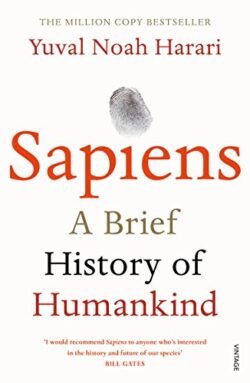“Sapiens: A Brief History of Humankind” by Yuval Noah Harari, first published in 2011, is a thought-provoking exploration of the history of the human species from the emergence of Homo sapiens in Africa up to the 21st century. Harari weaves together insights from anthropology, psychology, economics, and other disciplines to examine how Homo sapiens came to dominate the planet. The book is divided into four parts: The Cognitive Revolution, The Agricultural Revolution, The Unification of Humankind, and The Scientific Revolution. These sections delve into the development of human societies, the creation and impact of complex cultures, the rise of empires and political systems, and the technological advancements that have dramatically reshaped human life.
Character Analysis
- As a non-fiction work that spans across centuries of human history, "Sapiens" does not follow a traditional narrative structure with characters. Instead, Homo sapiens, or modern humans, are the central focus, with Harari analyzing how their cognitive abilities, social structures, and cultural innovations have evolved over time.
Themes and Analysis
- Cognitive Development: Harari emphasizes the Cognitive Revolution, approximately 70,000 years ago, as a pivotal moment that enabled Homo sapiens to surpass other species through the development of language, art, and complex social structures.
- Impact of Agriculture: The Agricultural Revolution is presented as a double-edged sword that allowed human populations to grow but also led to social hierarchies, harder work, and new forms of inequality.
- Power of Shared Myths: A recurring theme is the role of shared beliefs and myths in creating large-scale human cooperation, ranging from religions and political ideologies to economic systems like capitalism.
- Technological Progress and Future Challenges: The book discusses the ongoing Scientific Revolution, raising questions about the future of Sapiens in the face of rapid technological change, potential ecological collapse, and advances in biotechnology and artificial intelligence.
“Sapiens: A Brief History of Humankind” offers a sweeping overview of human history, challenging readers to consider the ways in which biology, history, and the capacity for storytelling have shaped the world. Harari’s engaging narrative and interdisciplinary approach make complex concepts accessible and compelling. The book not only recounts the past but also prompts reflection on the future of Homo sapiens, making it a seminal work for understanding humanity’s place in the history of the Earth and pondering what lies ahead. Harari’s insights into human nature, power, and the potential paths for our species provoke deep thought and discussion, cementing “Sapiens” as a must-read for anyone interested in the story of humankind.
If the summary caught your interest,
Consider reading the full book on AbeBooks.
Explore this book on AbeBooks
